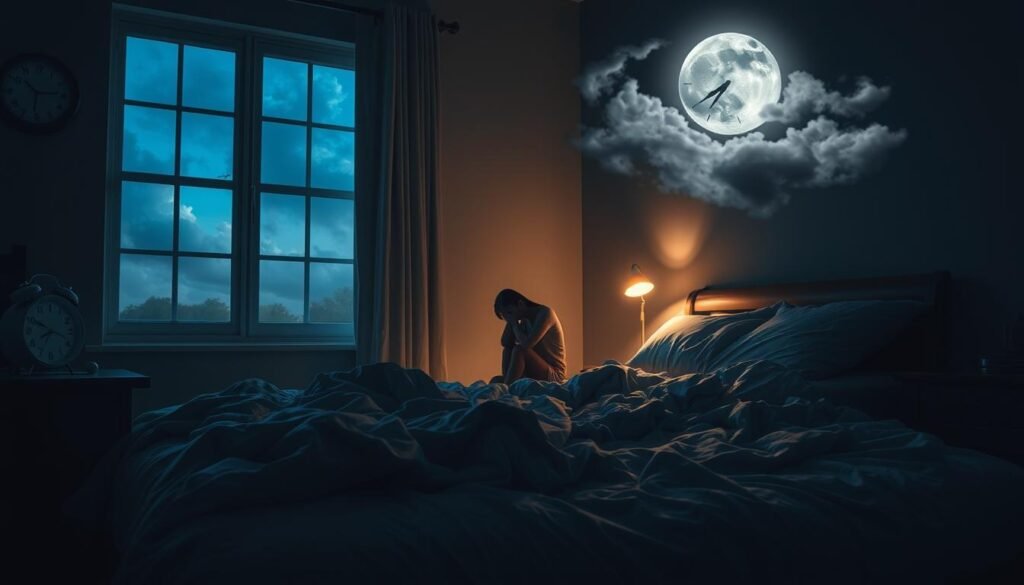About 30% of American adults struggle with insomnia symptoms. This fact shows how anxiety greatly affects sleep and mental well-being. Anxiety is the most widespread mental health challenge in the U.S. It hits people of all ages, genders, and backgrounds. The mix of anxiety, racing thoughts, and insomnia can heavily disrupt life. It leads to problems like poor cognitive function and a higher risk of mental health issues.
This guide helps you understand and manage racing thoughts and insomnia caused by anxiety. It looks into both the physical and mental sides of this issue. With this knowledge, you aim for better sleep and mental health. For many, racing thoughts are an unwelcome nightly visitor that blocks relaxation. Knowing how to handle these can be key to getting good sleep. For more info, check out this detailed article on managing racing.
Key Takeaways
- Anxiety disorders are prevalent, affecting approximately 30% of the U.S. adult population.
- Racing thoughts at night often lead to insomnia and can be exacerbated by various stressors.
- Effective coping mechanisms include relaxation techniques and mindfulness practices.
- Understanding the link between anxiety and sleep is essential for improving overall mental health.
- Professional help may be necessary when racing thoughts become disruptive or persistent.
What Is Anxiety?
Anxiety is when you feel worried or uneasy, especially when you’re stressed. It’s normal to feel this way at times. But when worry becomes too much, it can mess up your daily life. Around 20% of adults in the U.S. struggle with anxiety disorders. These disorders include Generalized Anxiety Disorder (GAD), Panic Disorder, and Social Anxiety Disorder.
People with anxiety might feel their heart beat fast, sweat a lot, get irritable, and feel scared. These symptoms can make life harder. Panic disorder and bipolar disorder are closely linked to worrying a lot. This is because people with these disorders often have too many worrisome thoughts that they can’t control.
One way to handle these thoughts is through Cognitive-behavioral therapy (CBT). CBT helps by changing the way you think. Some people might need medicine to feel better. Mindfulness, meditation, and muscle relaxation are also good ways to calm your mind.
If you want to learn more about anxiety, check out this guide on racing thoughts. Knowing the signs and getting help can make a big difference in dealing with anxiety.
| Type of Anxiety Disorder | Common Symptoms | Impact on Daily Life |
|---|---|---|
| Generalized Anxiety Disorder (GAD) | Excess worry, restlessness, fatigue | Difficulty concentrating, sleep disturbances |
| Panic Disorder | Frequent panic attacks, heart palpitations, sweating | Avoidance of certain situations, impaired social interactions |
| Social Anxiety Disorder | Intense fear of social situations, sweating, trembling | Avoidance of social events, isolation |
The Relationship Between Anxiety and Sleep
Anxiety and sleep are deeply connected and affect our health. Insomnia is a common sleep disorder that often affects people with anxiety. This problem can make falling asleep hard, keep you awake at night, or cause you to wake up early. These issues can worsen anxiety symptoms, creating a vicious cycle.
About 24% to 36% of people with insomnia also experience anxiety disorders. Anxiety can mess with your sleep too. It can take you longer to fall asleep, reduce your deep sleep, and cut down on REM sleep. Anxiety triggers a stress response that releases cortisol, making it hard to relax and sleep well.
To deal with this two-way relationship, it’s important to have good strategies. Improving sleep habits can make sleep quality better and ease anxiety. Techniques like mindfulness, deep breaths, and exercise can help calm anxiety and improve sleep. Cognitive Behavioral Therapy (CBT) is also effective for treating insomnia caused by anxiety. In some cases, medication may be needed to help with sleep and anxiety.
| Insomnia Type | Description | Relation to Anxiety |
|---|---|---|
| Difficulty Falling Asleep | Struggling to initiate sleep despite feeling tired. | Heightened worries and racing thoughts may impede relaxation. |
| Difficulty Staying Asleep | Waking frequently during the night, unable to return to sleep. | Anxiety symptoms can trigger awakenings or restlessness. |
| Early Morning Awakening | Waking up much earlier than desired, unable to go back to sleep. | Anxious thoughts may lead to feelings of dread upon waking. |
Understanding how anxiety and sleep affect each other is key to managing them. By treating sleep disorders, we can also lessen anxiety. This helps improve mental and physical health.
Understanding Racing Thoughts and Insomnia from Anxiety
Racing thoughts, characterized by rapid and often repetitive thinking, frequently plague individuals experiencing anxiety. These thoughts can become particularly troublesome at night. They make it a challenge for many to unwind and find restful sleep. Stress, significant life transitions, and mental health issues like bipolar disorder and obsessive-compulsive disorder (OCD) are often to blame.
Overview of Racing Thoughts
Racing thoughts often emerge during periods of heightened anxiety and can significantly impact sleep quality. Job stress, financial pressures, or traumatic experiences may lead to a scenario where thoughts race uncontrollably. For those with anxiety disorders, these thoughts can worsen, creating a distressing cycle. External pressures and internal fears can lead to a sense of being overwhelmed.
How Racing Thoughts Contribute to Insomnia
The link between racing thoughts and insomnia is well-known. When people try to sleep, their minds may stay active with worries. This inability to relax often leads to insomnia, making the individual feel drained. Things like too much caffeine or certain medications can make racing thoughts worse. However, mindfulness practices or cognitive behavioral therapy can help manage these thoughts.
Common Causes of Racing Thoughts
Racing thoughts often come from anxiety and mental health issues. Knowing why they happen helps us deal with them better. This understanding makes it easier for people to handle their experiences.
Life Stressors and Anxiety
Life throws many challenges our way, causing racing thoughts. They include:
- Job loss
- Financial concerns
- Significant life changes, such as having a baby
- Relationship difficulties
These challenges can make anxiety worse. This leads to a flood of thoughts. They often come at night, making sleep hard to find.
Mental Health Disorders Associated with Racing Thoughts
Certain mental health issues are behind racing thoughts. These issues include:
- Anxiety disorders
- Bipolar disorder
- Obsessive-compulsive disorder (OCD)
- Attention-deficit/hyperactivity disorder (ADHD)
- Post-traumatic stress disorder (PTSD)
About 18% of the U.S. population, or 40 million people, have anxiety disorders. Many of them have racing thoughts. ADHD often causes fast and scattered thoughts, leading to sleep problems. Too much thyroid hormone can also cause racing thoughts. Finding out about these disorders can help people get the right support and therapy.

Impact of Insomnia on Mental Health
Insomnia greatly affects mental health, leading to both physical and emotional issues. Grasping the tie between lack of sleep and its fallout is key. This helps tackle the problems it brings.
Physical and Emotional Effects of Sleep Deprivation
Sleep loss often causes mood swings and lowers brain function. People with insomnia struggle with everyday tasks and keeping up friendships. Studies show that half the folks with depression also face anxiety.
Insomnia’s toll isn’t just tiredness. It can make anxiety worse and trigger serious mental health troubles, like panic attacks and ongoing worry. This creates a tough cycle of anxiety and sleepless nights. Finding ways to cope is crucial for many.
A high number of combat veterans with PTSD have trouble sleeping. Knowing how insomnia affects mental health is vital. It encourages those affected to seek help and treatment for sleep and mental issues.
Coping Mechanisms for Racing Thoughts and Insomnia
Using coping mechanisms is vital to lessen racing thoughts and insomnia. Several relaxation and mindfulness techniques can help. They make the night more peaceful and aid in handling restless thoughts.
Relaxation Techniques to Promote Sleep
There are many relaxation methods to help with racing thoughts at night. Some techniques are:
- Controlled Breathing Exercises: Deep, slow breaths help calm the mind and lessen rapid thoughts.
- Progressive Muscle Relaxation: Tightening and then relaxing muscles boosts relaxation, aiding those with insomnia.
- Guided Imagery: Thinking of soothing scenes can shift focus from stress, helping with sleep.
Mindfulness and Meditation Practices
Mindfulness and meditation can really help manage racing thoughts. These methods increase self-awareness and provide ways to handle anxiety:
- Mindful Acknowledgment: Noticing thoughts without judging them lessens their impact, especially before sleep.
- Scheduled Worry Sessions: Having set times to think about concerns reduces stress at night, leading to quieter sleep.
- Gratitude Practices: Thinking about the day’s positives shifts focus from worries, improving sleep.

Adding these coping methods to a regular nighttime routine can greatly help manage thoughts and insomnia. Embracing both relaxation and mindfulness leads to improved mental health and better sleep.
| Technique | Benefits |
|---|---|
| Controlled Breathing | Reduces anxiety and calms the mind |
| Progressive Muscle Relaxation | Addresses physical tension contributing to insomnia |
| Mindful Acknowledgment | Helps detach from racing thoughts |
| Gratitude Practices | Increases positive emotions, reducing worry |
| Guided Imagery | Promotes a peaceful mindset conducive to sleep |
Effective Treatments for Anxiety-Related Insomnia
Anxiety and sleep issues can really change how you live. It’s key to find treatments that deal with both. Cognitive Behavioral Therapy (CBT) is a top choice. It works by changing the negative thoughts that cause anxiety and lack of sleep.
Cognitive Behavioral Therapy (CBT)
CBT-i focuses on fixing the root of insomnia and offers lasting fixes. It includes methods like Stimulus Control and Sleep Restriction. It also covers Sleep Hygiene and Cognitive Therapy. Many people say they sleep better and think clearer after CBT-i.
- Stimulus Control Techniques: They make the bedroom a place for sleep only.
- Sleep Restriction Therapy: This cuts down the time you stay in bed to help you sleep without waking up.
- Cognitive Restructuring: Changes bad thoughts that raise anxiety and mess with sleep.
- Relaxation Techniques: These methods calm you and slow down your thoughts before sleep.
- Sleep Hygiene Education: Teaches good sleep habits to improve how well you sleep.
About 70% to 80% of people with severe insomnia get better with CBT-i. It helps with both sleep and anxiety. This leads to healthier sleep and a better life.
Medications for Managing Anxiety and Insomnia
Medicines also help with anxiety-related insomnia. About 30-50% of folks use benzodiazepines. Z-drugs help another 15-30% of patients, while DORAs aid 10-20%. Also, 20-40% of people take over-the-counter antihistamines like diphenhydramine. While fast acting, it’s best to talk to a doctor for the right plan.
For deeper insights into fixing insomnia, you can check effective treatments.
Role of Sleep Hygiene in Managing Insomnia
Improving your daily routines with sleep hygiene can better your sleep quality. Having a space that’s good for sleep and sticking to a sleep schedule help fight insomnia.
Creating a Sleep-Conducive Environment
For better sleep, your bedroom needs to be calming. A good sleep setting includes:
- Darkness: Block out light with blackout curtains.
- Quiet: Use white noise machines or earplugs to keep it quiet.
- Comfortable Bedding: Get comfy mattresses and pillows for good sleep.
- Temperature Control: A cool room, about 60-67°F, is best for sleep.
Establishing a Consistent Sleep Routine
Having a steady sleep routine helps your body’s clock stay on track. This means:
- Fixed Sleep Schedule: Sleep and wake at the same times every day, weekends included.
- Pre-Sleep Rituals: Do calm activities like reading or meditating before bed.
- Limit Screen Time: Avoid screens an hour before bed to prevent sleep disruption.
- Avoid Stimulants: Don’t have caffeine or big meals before sleeping.
Following these steps will boost your sleep hygiene. This leads to better sleep and less insomnia.
When to Seek Professional Help
It’s key to know when anxiety and insomnia get bad. Watch out for constant worry, sleep trouble, or feeling upset day-to-day. Knowing signs for therapy helps you decide when to get help.
Signs Indicating the Need for Therapy
Many signs show you might need therapy. They include:
- Chronic insomnia despite trying to sleep better.
- Persistent racing thoughts messing with daily life.
- Getting easily upset or mood swings from lack of sleep.
- Feeling anxious physically, like a fast heartbeat or short breaths.
- Problems at work or in personal life because of anxiety.
Dealing with these signs can make your mental health and life better.
Working with Healthcare Providers
Talking to healthcare providers is vital for those dealing with anxiety. They check your symptoms and past mental health. From this, they can make a plan suited for you. This could mean therapy, medicine, or different daily habits. Working with them can seriously help fix anxiety issues.
| Indicator | Action |
|---|---|
| Persistent insomnia | Consider seeking professional help |
| Racing thoughts | Consult with a healthcare provider |
| Emotional distress | Explore therapy options |
| Physical anxiety symptoms | Schedule an appointment with a healthcare professional |
| Impact on daily life | Seek comprehensive mental health support |
Choosing to get professional help can better manage anxiety and its side effects. This opens up a path to a more stable, enjoyable life.
Key Takeaways from This Guide
This guide sheds light on the complex link between racing thoughts and insomnia. It focuses on how these issues tie into managing anxiety. It’s important to know that about half of all people with anxiety also struggle with insomnia. Racing and persistent thoughts make falling asleep harder.
One key point is how common insomnia is among people. Statistics show that 30-35% of people face short-term insomnia. Meanwhile, chronic insomnia affects about 10% of the population. A huge 70-91% of those with major depression also have trouble sleeping. This shows how critical it is to find good ways to manage anxiety.
There are several effective ways to tackle anxiety-induced insomnia. Cognitive Behavioral Therapy for Insomnia (CBT-I) stands out for its success. Adding sleep hygiene practices can also make a big difference in sleep quality. Even behavior treatments made for kids have shown to be effective.
Lifestyle choices like drinking alcohol or caffeine can make insomnia worse. When it comes to calming racing thoughts, certain methods can be helpful. Imagery distraction and accepting these thoughts can lead to better sleep. Practicing gratitude and focusing on positive images before bed can also improve sleep.
- Awareness of the interplay between anxiety, racing thoughts, and insomnia is essential.
- Cognitive Behavioral Therapy is effective for treating both insomnia and anxiety.
- Sleep hygiene practices can significantly impact sleep quality.
- Understanding and acceptance of intrusive thoughts can alleviate their negative effects.
| Condition | Percentage Affected |
|---|---|
| Brief Symptoms of Insomnia | 30-35% |
| Chronic Insomnia | 10% |
| Insomnia in Anxiety Patients | 50% |
| Insomnia in Major Depressive Disorder | 70-91% |

Conclusion
Anxiety plays a big part in causing racing thoughts and sleepless nights for many. It’s linked to stress and difficulty sleeping. This means it’s really important to handle stress well. Things like losing a job or trouble in relationships can make these issues worse. It’s key for people to find out what’s causing their sleep problems.
To deal with anxiety and sleep better, try a calming routine before bed and set aside time to worry. Also, getting help from a professional can make a big difference. Breaking problems down and doing things like meditating or reading can help bring back peaceful sleep. These steps are especially important for those facing long-term sleeplessness, which can harm health if ignored.
Finding a way to better sleep begins with tackling racing thoughts and finding the right treatment. People should try ways to relax and talk to doctors about anxiety issues if needed. By making sleep and mental health a priority, anyone can start to overcome anxiety’s effects on sleep.